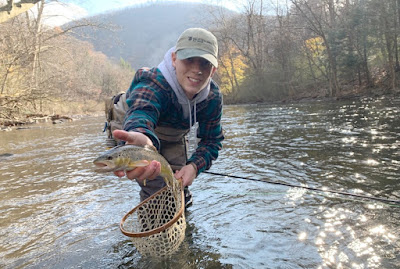By Kelly Jedrzejewski, Penn State News
Junior Matthew Bellia, an Environmental Resource Management major in Penn State’s College of Agricultural Sciences, spent his summer completing a research-based internship with the Pennsylvania Fish and Boat Commission.
Bellia, of Beaver Falls, delved into a variety of research topics for the Commission. The data he collected will be used by the Commission to support research and improve the management of the Commonwealth's fishery resources.
Bellia, who is pursuing a minor in Wildlife and Fisheries Science, also earned three credits for the virtual internship.
The novel coronavirus did change what Bellia's internship was supposed to look like; however, he said he was glad for the opportunity to work for the Commission.
“It’s been a good experience that will help with future internships and my future career,” he said. “Originally, I was going to be conducting angler-use surveys. I would have been going out to specific stretches of streams and counting and interviewing anglers to collect data.”
From his home office, Bellia used Penn State Libraries to access scholarly publications and articles on his research topics.
The first topic he investigated was the use of triploid trout in stocking programs. Bellia explained that there could be several benefits of using sterile triploid trout, including minimizing the chances of hatchery trout reproducing in streams as well as increases in growth and reductions in mortality in the hatchery.
“If you stock trout into a watershed with a wild population, they can potentially reproduce with the wild trout species, resulting in genetic problems,” he said. “By using triploid trout, you can better protect the wild trout from introgression, while increasing the yield for anglers.”
Bellia also spent time examining trout-mortality rates for fish that have been caught, taking into account the amount of time they spent out of the water, what kinds of fishing lures were used, water temperatures and trout species.
The next topic was a broader base of research on anglers.
“For this, I looked at different variables related to people fishing for wild trout, like how many times a year they go out, how many hours they spend out and other general information to create a reference guide,” he said.
The Environmental Resource Management program, referred to as ERM, first connected with Jason Detar, of the Pennsylvania Fish and Boat Commission, at the College of Ag Sciences Career Day, said Tammy Shannon, academic advising coordinator for the ERM major.
“ERM is an interdisciplinary environmental science major that has many students focused on water quality and minoring in Wildlife and Fisheries Science,” she said. “The opportunities for ERM students to intern at the commission seemed to be a natural fit. The program is grateful for the opportunities that have been provided to students over the years.”
Several Penn State ERM students have participated in this internship; Austen Randecker was one of the first.
“The Pennsylvania Fish and Boat Commission was a great place to intern,” said Randecker, who recently accepted a position as a fisheries biologist with the commission. “I gained valuable field and computer skills and I recommend the opportunity to anyone looking into a career related to environmental sciences or biology.”
The student interns from Penn State’s ERM program have done a great job, said Detar. “It's been a great way to provide them with real-world experience, and they complete important tasks to help us manage the Commonwealth’s fisheries,” he said. “I look forward to a continued partnership with Penn State.”
Bellia added that being part of Penn State has put him in a position to work with an organization such as the commission.
“I have learned a ton and it has given me a good perspective on the work the commission does and how much background work goes into every decision it makes to influence a change in legislation or law."
Bellia hopes to have a career that involves water science, stream restoration, water quality management or watershed management. He encourages students to take advantage of virtual internships.
“You are going to learn a lot,” he said. “Just because something is virtual doesn't mean you should pass up the opportunity. If it is something outside of your specific area of interest, you’ll have the chance to get a different perspective and maybe learn about another opportunity you wouldn’t have found otherwise.”
(Reprinted from Penn State News.)
Related Articles:
[Posted: August 27, 2020] PA Environment Digest


No comments :
Post a Comment